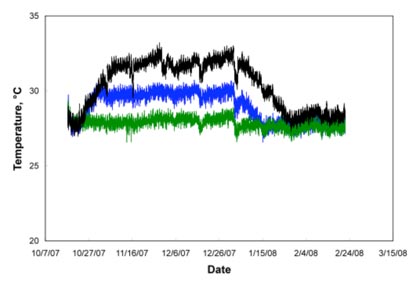Dr. Chris Langdon and Dr. Andrew Baker are conducting a three-year NSF-funded study on the response of several South Florida coral species (Porites divarcata, Montastrae faveolata, and Acropora cervicornis) to the combined effects of elevated temperature and CO2. They want to learn if some species have a greater or lesser capability to adapt to warming temperatures and increasing acidity of the water. Their hypothesis is that some species will be able resist extreme conditions by selecting a new algal partner that is better adapted physiologically to the new conditions. The experiment will make use of the Coral Reef & Climate Change Laboratory facilities purpose built for these experiments.

Temperature of tanks during Run 1. There was an initial two-week during which temperature was slowly ramped up at a rate of 0.3°C per day from the preconditioned temperature of 28.0°C to the final treatment temperatures of 30.0°C and 32.0°C. This was followed by a 54-day period during which temperature and pCO2 was held constant. During this period the P. divarcata and M. faveolatacolonies in the 30.0 and 32.0°C tanks were observed to pale or bleach. Then the temperature was ramped down until all tanks were at 28.0°C again. This was followed with a 24-day period during which the recovery of the corals was observed.




